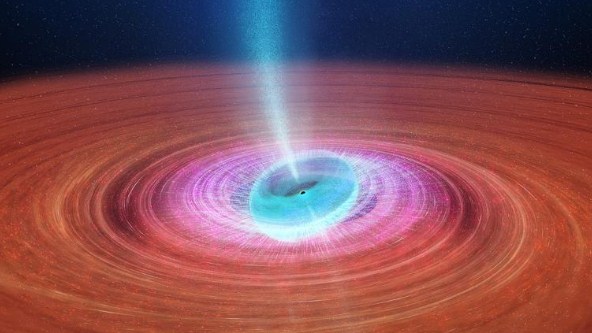Black hole jets shoot out material at 60% of the speed of light!

Nearly 8,000 light-years away from Earth, astronomers have discovered a black hole that keeps rapidly swinging out jets of plasma clouds into space, according to a new study.
The black hole, known as V404 Cygni, doesn’t behave like others. The jets shoot out possibly within minutes of each other and in all different directions. And while the researchers admit that black holes are some of the most extreme objects in the universe, this one is different.”This is one of the most extraordinary black hole systems I’ve ever come across,” study author James Miller-Jones said in a statement. Miller-Jones is also an associate professor at Curtin University’s International Centre for Radio Astronomy Research.
“Like many black holes, it’s feeding on a nearby star, pulling gas away from the star and forming a disk of material that encircles the black hole and spirals towards it under gravity,” he said. “What’s different in V404 Cygni is that we think the disk of material and the black hole are misaligned. This appears to be causing the inner part of the disk to wobble like a spinning top and fire jets out in different directions as it changes orientation.”The black hole was first discovered in 1989 because it released jets and radiation. Previous outbursts associated with this black hole were noted in 1938 and 1956 and found on archival photographic plates.
V404 Cygni caught the attention of astronomers around the world when it unleashed another bright outburst that lasted for two weeks in 2015. Telescopes everywhere trained on the event, which led to a wealth of observational data.Normally, jets shoot out from the poles of black holes. These jets were firing off in different directions at different rates over a couple of hours.
Astronomers have found the fastest-growing black hole ever seen, and it’s got a monster appetite
The black hole itself is rotating and the gravitational pull is so strong, it’s actually pulling nearby space and time around with it. This is called frame-dragging.The material in the jets is blasted out from the black hole’s rotating accretion disk. The disk forms when material from a nearby star is pulled into a circle around the black hole.
For scale, the black hole is nine times more massive than our sun and V404 Cygni’s disk is 10 million kilometers across. The jets shoot out material at 60% of the speed of light.Because the spin axis of the black hole is misaligned, frame-dragging also warps part of the disk, causing an intense wobbling that is responsible for the jets shooting off in different directions.”This is the only mechanism we can think of that can explain the rapid precession we see in V404 Cygni,” Miller-Jones said. “You can think of it like the wobble of a spinning top as it slows down, only in this case, the wobble is caused by Einstein’s general theory of relativity.”
The researchers had to use a different technique to capture what was happening in the black hole. Normally, they use long exposures.”These jets were changing so fast that in a four-hour image we saw just a blur,” said Alex Tetarenko in a statement, another of the study authors and East Asian Observatory Fellow.
Instead, 70-second-long individual exposures were combined to make a film of the action the astronomers were witnessing.
“We were gobsmacked by what we saw in this system — it was completely unexpected,” said Greg Sivakoff in a statement, study author and associate professor at the University of Alberta’s department of physics. “Finding this astronomical first has deepened our understanding of how black holes and galaxy formation can work. It tells us a little more about that big question: ‘How did we get here?'”





